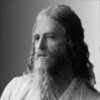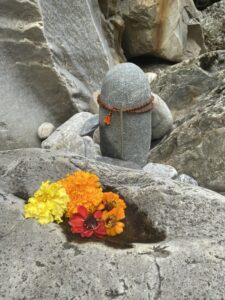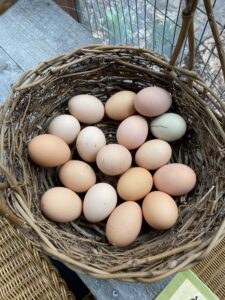Spanda Karikas is an important scripture of Kashmir Shaivism from the 10’th century AD. Translation by Prem Prakash – May 2020
Section I: Svarūpaspanda
The Primal Creative Impulse as One’s True Nature
1. Yasyonmeṣanimeṣābhyāṁ jagataḥ pralayodayau
Taṁ śakticakravibhavaprabhavaṁ śaṅkaraṁ stumaḥ
We extol Shiva Shankara, The Generator of Auspiciousness — the One Soul in the heart of all living beings– the genesis of all opulent, swirling, vibrating circles of energy. Opening and closing His eyes, the worlds emerge and dissolve.
2. Yatra sthitamidaṁ sarvaṁ kāryaṁ yasmācca nirgatam
Tasyānāvṛtarūpatvānna nirodho’sti kutracit
In a spirit of joy and play, curiosity and wonder, love and paradox, He unveils Himself. Nothing impedes His creative expression. All He brings forth is but His own Consciousness.
3. Jāgradādivibhede’pi tadabhinne prasarpati
Nivartate nijānnaiva svabhāvādupalabdhṛtaḥ
He is the sole Experiencer of all individual states of consciousness — waking, dreaming, and deep sleep. Individual experiences are not separate from the original Cosmic impulse of creation; the individual never departs its cause.
4. Ahaṁ sukhī ca duḥkhī ca raktaścetyādisaṁvidaḥ
Sukhādyavasthānusyūte vartante’nyatra tāḥ sphuṭam
The individual feels “I am happy, I am sad, I have desires,” etc. These states of mind seem to belong to the individual, but they are actually like beads strung on the thread of the One Experiencer, Shiva.
5. Na duḥkhaṁ na sukhaṁ yatra na grāhyaṁ grāhakaṁ na ca
Na cāsti mūḍhabhāvo’pi tadasti paramārthataḥ
Beyond pleasure and pain, happiness and sadness; beyond the experience of a separate world of objects; beyond the sense of a separate self; where nothing insentient exists because all and everything truly exists only as experience in Consciousness — this Experiencer is the Supreme Being, God, Shiva.
6. Yataḥ karaṇavargo’yaṁ vimūḍho’mūḍhavatsvayam
Sahāntareṇa cakreṇa pravṛttisthitisaṁhṛtīḥ
Labhate tatprayatnena parīkṣyaṁ tattvamādarāt
Yataḥ svatantratā tasya sarvatreyamakṛtrimā
Experience should be investigated with care and attention. The aggregate of instruments of individual experience — the senses, mind, intellect, and personal identity — though mere devices of Nature, appear to have their own independence.
These functions of the individual travel towards the world, produce temporal experiences and cognitions, and then dissolve back into the individual. These unpremeditated movements are microcosmic reflections of the freedom and play of the all-pervasive, macrocosmic God.
8. Na hīcchānodanasyāyaṁ prerakatvena vartate
Api tvātmabalasparśātpuruṣastatsamo bhavet
The limited individual is not the source of desire, or of will. By apprehending the freedom of her Source, and the power inherent in Cause, she harmonizes with God.
9. Nijāśuddhyāsamarthasya kartavyeṣvabhilāṣiṇaḥ
Yadā kṣobhaḥ pralīyeta tadā syātparamaṁ padam
When the self-centered agitations that precipitate personal desires dissipate, the true Self arises.
10. Tadāsyākṛtrimo dharmo jñatvakartṛtvalakṣaṇaḥ
Yatastadepsitaṁ sarvaṁ jānāti ca karoti ca
Then her intrinsic, divine nature, which is inherently wise, humorous, spontaneously playful and effortlessly active, flashes forth. At that time, all is known as a performance by Shiva alone.
11. Tamadhiṣṭhātṛbhāvena svabhāvamavalokayan
Smayamāna ivāste yastasyeyaṁ kusṛtiḥ kutaḥ
How then could the pitiful cycle of births and deaths be hers, who rises in wonderment, beholding the One essence pervading the life of all?
12. Nābhāvo bhāvyatāmeti na ca tatrāstyamūḍhatā
Yato’bhiyogasaṁsparśāttadāsīditi niścayaḥ
Non-existence is an impossibility, oblivion does not exist. The Experiencer, Shiva, is present even when the personal self is absent.
13. Atastatkṛtrimaṁ jñeyaṁ sauṣuptapadavatsadā
Na tvevaṁ smaryamāṇatvaṁ tattattvaṁ pratipadyate
The personal self is an abstract object of knowledge, maintained through constant recollection, such as after arising from deep sleep.
Shiva is ever-present, needing no support of memory.
14. Avasthāyugalaṁ cātra kāryakartṛtvaśabditam
Kāryatā kṣayiṇī tatra kartṛtvaṁ punarakṣayam
The yogic tradition teaches of two states: activity and Actor. All activity is time-based, hence, transitive. The Actor is eternal, imperishable.
15. Kāryonmukhaḥ prayatno yaḥ kevalaṁ so’tra lupyate
Tasmim̐llupte vilupto’smītyabudhaḥ pratipadyate
In meditative absorption, individual effort disappears. Only a fool, upon cessation of effort, would think, “I have disappeared.”
16. Na tu yo’ntarmukho bhāvaḥ sarvajñatvaguṇāspadam
Tasya lopaḥ kadācitsyādanyasyānupalambhanāt
There is no cessation of the Divine Being, Shiva. He is the sole Subject; whatever arises in perception abides in Him and is nothing but Him.
17. Tasyopalabdhiḥ satataṁ tripadāvyabhicāriṇī
Nityaṁ syātsuprabuddhasya tadādyante parasya tu
The enlightened sage is always, in all ways, awake to the one Self, sustaining awareness in the three states of waking, dream, and deep sleep. Others, still unenlightened, only experience the Self on occasion, such as in meditation or through contrast as the three states fluctuate.
18. Jñānajñeyasvarūpiṇyā śaktyā paramayā yutaḥ
Padadvaye vibhurbhāti tadanyatra tu cinmayaḥ
The all-pervading Self illuminates the two states of waking and dream, and His supreme energy endows them with seeming disparate subjects and objects. In deep sleep and meditative absorption, His energy is the illuminated Consciousness alone.
19. Guṇādispandaniṣyandāḥ sāmānyaspandasaṁśrayāt
Labdhātmalābhāḥ satataṁ syurjñasyāparipanthinaḥ
The emanations of Spanda, the original creative impulse, begin with the gunas, foundational qualities of Nature (rajas, agitation; sattva, balance; tamas, inertia). All creation springs from the fertile soil of Spanda. The one possessing Self-wisdom is not impeded by anything in manifestation.
20. Aprabuddhadhiyastvete svasthitisthaganodyatāḥ
Pātayanti duruttāre ghore saṁsāravartmani
It is not the energy of Spanda, itself, that produces suffering. Rather, the mis-perception by the unwise of diverse individuals and phenomenal events as separate from the whole continually obscures Reality and results in a lifestream of fear-based, unremitting, cyclic frustrations, so difficult to curtail.
21. Ataḥ satatamudyuktaḥ spandatattvaviviktaye
Jāgradeva nijaṁ bhāvamacireṇādhigacchati
One who persistently endeavors to discern the unitary Spanda principal speedily takes claim of her own innate nature. This awareness persists even when not formally meditating, such as in the waking state.
22. Atikruddhaḥ prahṛṣṭo vā kiṁ karomīti vā mṛśan
Dhāvanvā yatpadaṁ gacchettatra spandaḥ pratiṣṭhitaḥ
Spanda is anchored when one maintains awareness during, and can even be precipitated by, intense emotions, such as when one is extremely angry, overjoyed, confused, or fearful for her life.
23. Yāmavasthāṁ samālambya yadayaṁ mama vakṣyati|
Tadavaśyaṁ kariṣye’hamiti saṅkalpya tiṣṭhati
Firmly embracing awareness of Spanda, the alert yogi remains steadfast, vowing, “However I am guided, that I will carry out.”
24. Tāmāśrityordhvamārgeṇa candrasūryāvubhāvapi
Sauṣumne’dhvanyastamito hitvā brahmāṇḍagocaram
By entering the stream of Spanda, the moon of one’s feminine qualities coalesce in the inhalation. and the sun of one’s masculine qualities coalesce in the exhalation, merging in the sushumna, the subtle channel of the spinal cord. This union inspires Kundalini Shakti, the energy of Divine Mother, to rise up the sushumna and pass beyond even the realm of Brahma’s egg, the source of all material creation, at the crown of the skull. Then the individual, the jiva, dissolves in the Universal, Shiva.
25. Tadā tasminmahāvyomni pralīnaśaśibhāskare
Sauṣuptapadavanmūḍhaḥ prabuddhaḥ syādanāvṛtaḥ
When the cauldron of Kundalini is stirred by the moon-like inhalation and sun-like exhalation, a profound meditative state occurs and one becomes absorbed in the vast sky of consciousness. The aspiring yoga experiences this state as as a void, like in deep sleep. The accomplished yogi, free of all cloaks of illusion, is able to sustain Self-awareness in this state.
Section II: Sahaja Vidyodaya
The Arising of Spontaneous Wisdom
1. Tadākramya balaṁ mantrāḥ sarvajñabalaśālinaḥ
Pravartante’dhikārāya karaṇānīva dehinām
On a macrocosmic level, the force of Spanda impels mantras of wisdom and power into activity of behalf of bound souls. On a microcosmic level, Spanda precipitates the functions of mind and senses in embodied beings.
2. Tatraiva sampralīyante śāntarūpā nirañjanāḥ
Sahārādhakacittena tenaite śivadharmiṇaḥ
When a mantra produces peace and flawlessness in the individual consciousness of a devotee, the energy of the mantra and individual are absorbed into Spanda. Such is the divine function of Shiva’s mantras.
3. Yasmātsarvamayo jīvaḥ sarvabhāvasamudbhavāt
Tatsaṁvedanarūpeṇa tādātmyapratipattitaḥ
4. Tasmācchabdārthacintāsu na sāvasthā na yā śivaḥ
Bhoktaiva bhogyabhāvena sadā sarvatra saṁsthitaḥ
On a microcosmic level, the individual soul is non-different from his world, as all she experiences is generated in her own consciousness.
On a macrocosmic level, there is no objective or subjective phenomenon — be it sights, sounds, or individual, sentient subjects — nothing exists separate from Shiva.
Whether jiva or Shiva, individual soul or Cosmic Soul, the experiencer is one with their experience and their world.
5. Iti vā yasya saṁvittiḥ krīḍātvenākhilaṁ jagat
Sa paśyansatataṁ yukto jīvanmukto na saṁśayaḥ
She who sustains the realization of the union of jiva and Shiva enjoys the vision of the entire world as a divine, sportive whim. She is most certainly a jivanmukta, liberated while living in the world.
6. Ayamevodayastasya dhyeyasya dhyāyicetasi
Tadātmatāsamāpattiricchataḥ sādhakasya yā
The aspirant with firm-will attains meditative fusion: the escalating realization that whatever she meditates upon exists solely in, and as, her consciousness.
7. Iyamevāmṛtaprāptirayamevātmano grahaḥ
Iyaṁ nirvāṇadīkṣā ca śivasadbhāvadāyinī
This is the only means of attaining the nectar of immortality; the singular realization of the true Self; the initiation into nirvana, the dissolution of the false self, that bestows the eternal state of Shiva, God-consciousness.
Section III: Vibhūti Spanda
The Opulences of The Primal Impulse
1. Yathecchābhyarthito dhātā jāgrato’rthān hṛdi sthitān
Somasūryodayaṁ kṛtvā sampādayati dehinaḥ
The embodied yogi’s world manifests as she directs her will and prayers, her inner sun and moon, to Shiva, as the provider of all for which her heart yearns.
2. Tathā svapne’pyabhīṣṭārthānpraṇayasyānatikramāt
Nityaṁ sphuṭataraṁ madhye sthito’vaśyaṁ prakāśayet
For one who is consistent in devotion, Shiva abides in her central channel and, from within, with radiant clarity, eternally illuminates the external dream of her world.
3. Anyathā tu svatantrā syātsṛṣṭistaddharmakatvataḥ
Satataṁ laukikasyeva jāgratsvapnapadadvaye
For people not engaged in yoga, the natural flow of Spanda is undirected and will manifest as the common perceptions of the imaginary, mentally conceived world.
4. Yathā hyartho’sphuṭo dṛṣṭaḥ sāvadhāne’pi cetasi
Bhūyaḥ sphuṭataro bhāti svabalodyogabhāvitaḥ
Objects will be distorted, seen through biased eyes, unless one applies concerted effort to ensure clarity of perception.
5. Tathā yatparamārthena yena yatra yathā sthitam
Tattathā balamākramya na cirātsampravartate
The yogi aligns herself with the power of Spanda, so without effort or delay she accurately recognizes all forms throughout space and time as they actually are.
6. Durbalo’pi tadākramya yataḥ kārye pravartate
Ācchādayedbubhukṣāṁ ca tathā yo’tibubhukṣitaḥ
No matter how feeble, when one aligns herself with Spanda, whatever she needs to do is successfully accomplished, even overcoming hunger.
7. Anenādhiṣṭhite dehe yathā sarvajñatādayaḥ
Tathā svātmanyadhiṣṭhānātsarvatraivaṁ bhaviṣyati
Just as the individual is fully aware of her body, when the Self is aware of Spanda, awareness is all-pervading.
8. Glānirviluṇṭhikā dehe tasyāścājñānataḥ sṛtiḥ
Tadunmeṣaviluptaṁ cetkutaḥ sā syādahetukā
Depression is the loss of inherent delight. It is a thief plundering the body of vitality, entering through the door of spiritual ignorance. With unmesha, the practice of deliberately engaging uplifting thoughts, depression vanishes as its cause is destroyed.
9. Ekacintāprasaktasya yataḥ syādaparodayaḥ
Unmeṣaḥ sa tu vijñeyaḥ svayaṁ tamupalakṣayet
Unmesha is the skillful means by which one intentionally replaces a contractive, fear-based thought with an uplifting, expansive thought. This process is entirely internal.
10. Ato vindurato nādo rūpamasmādato rasaḥ
Pravartante’cireṇaiva kṣobhakatvena dehinaḥ
The practice of unmesha may bring divine lights, inner sounds, visions of astral beings, ethereal tastes and smells. These, however, should be considered distractions by the aspirant, as the goal is only awareness of Self and Spanda.
11. Didṛkṣayeva sarvārthānyadā vyāpyāvatiṣṭhate
Tadā kiṁ bahunoktena svayamevāvabhotsyate
While the yogi is seeking to attain the goal of seeing Spanda expressing the Self in all objects, she will find little external support, but her experience will be self-confirming.
12. Prabuddhaḥ sarvadā tiṣṭhejjñānenālokya gocaram
Ekatrāropayetsarvaṁ tato’nyena na pīḍyate
The fully awakened yogi is never disturbed by anything external because she feels her world to exist solely as Spanda expressing her own Self.
13. Śabdarāśisamutthasya śaktivargasya bhogyatām
Kalāviluptavibhavo gataḥ sansa paśuḥ smṛtaḥ
Believing she has been divested of her divine glory by time and death, the bound soul becomes like food devoured by the collective external forces existing in the worlds of mundane constructions.
14. Parāmṛtarasāpāyastasya yaḥ pratyayodbhavaḥ
Tenāsvatantratāmeti sa ca tanmātragocaraḥ
The rise of limiting concepts in the mind of a bound soul causes her to lose passion for the supreme nectar of immortality. She becomes easily influenced by, and dependent upon, the world of covert, superficial influences.
15. Svarūpāvaraṇe cāsya śaktayaḥ satatotthitāḥ
Yataḥ śabdānuvedhena na vinā pratyayodbhavaḥ
The power of thought and language exerts a perpetual pressure on the embodied soul. Ideas and concepts combine to create a mental world that veils the divine world.
16. Seyaṁ kriyātmikā śaktiḥ śivasya paśuvartinī
Bandhayitrī svamārgasthā jñātā siddhyupapādikā
Spanda, the power of Shiva, is Creation’s activating energy which seems to bind the unwise soul. That same energy, when understood through wisdom as an expression of Shiva, becomes the path to achieving spiritual mastery.
17. Tanmātrodayarūpeṇa mano’hambuddhivartinā
Puryaṣṭakena saṁruddhastadutthaṁ pratyayodbhavam
18. Bhuṅkte paravaśo bhogaṁ tadbhāvātsaṁsaredataḥ
Saṁsṛtipralayasyāsya kāraṇaṁ sampracakṣmahe
The “City of Eight,”the subtle body, consists of: the five foundational energies which generate the senses, plus cognitive mind, intuition, and ego. The City arises from Nature’s subtle powers. The soul self-imprisons in this body by her own ideas and concepts based on a mortal self-image, along with notions of pleasure and pain.
The subtle body is the vehicle of reincarnation and futile seeking, as it continues after the death of the physical body. This text is offered as a means of dissolving the causes of identity with the subtle body and the resulting transmigrations.
19. Yadā tvekatra saṁrūḍhastadā tasya layodayau
Niyacchanbhoktṛtāmeti tataścakreśvaro bhavet
By bring firmly rooted in Spanda, the subtle body becomes malleable. The soul is then able to relax and enjoy, and merge into Shiva, the protagonist of the initial creative impulse and its opulent, swirling, vibrating, circles of energy.
Section IV: Conclusion
1. Agādhasaṁśayāmbhodhisamuttaraṇatāriṇīm
Vande vicitrārthapadāṁ citrāṁ tāṁ gurubhāratīm
I offer my homage to this glorious teaching of the guru, filled with varied and wonderful instructions, which enables one to safely cross the unfathomable ocean of doubt.
2. Labdhvāpyalabhyametajjñānadhanaṁ hṛdguhāntakṛtanihiteḥ
Vasuguptavacchivāya hi bhavati sadā sarvalokasya
Attaining this treasure of wisdom, so difficult to discover, I keep it safe in the cave of my heart for my own good and for the welfare of the the whole world, following in the footsteps of the author, Vasugupta.




